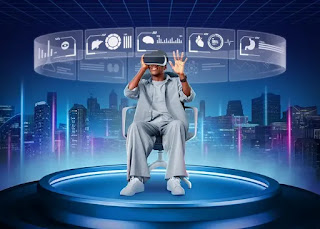In recent years, the concept of the metaverse has shifted from science fiction to a tangible and transformative reality. The metaverse, a virtual reality space where users can interact with a computer-generated environment and other users, is gaining momentum, revolutionizing not only the way we connect but also the global economy.
### Unveiling the Metaverse
The metaverse is more than just a virtual playground; it's a parallel digital universe where people can live, work, and play. Virtual reality technologies, combined with augmented reality and other immersive experiences, contribute to the creation of this expansive and interconnected space. From socializing with friends in virtual environments to attending virtual conferences and even working in digital offices, the metaverse is reshaping the dynamics of human interaction.
### Social Interaction Redefined
One of the primary impacts of the metaverse is the redefinition of social interaction. Traditional barriers of physical distance are obliterated as individuals can connect from anywhere in the world. Avatars replace physical appearances, democratizing social experiences and fostering inclusivity. Friends, family, and colleagues can seamlessly share experiences, breaking the limitations imposed by geographical boundaries.
Moreover, the metaverse opens the door to new forms of expression and creativity. Users can design their virtual spaces, create personalized avatars, and engage in activities that transcend the constraints of the physical world. This freedom of expression has the potential to spark innovative collaborations and cultural shifts.
### Economic Transformations
Beyond its social implications, the metaverse is a burgeoning economic force. Virtual real estate, digital assets, and the creation of virtual goods and services are becoming lucrative markets. Blockchain technology plays a pivotal role in securing ownership and transactions within the metaverse, enabling users to buy, sell, and trade digital assets with confidence.
The rise of the metaverse also introduces new opportunities for businesses. Virtual storefronts and digital marketplaces are emerging, catering to a global audience. Companies are exploring ways to establish a presence in the metaverse, whether through virtual events, immersive advertising, or offering virtual services.
### Challenges and Considerations
While the metaverse presents exciting possibilities, it also raises important questions and concerns. Issues related to privacy, security, and the potential for digital addiction warrant careful consideration. As people spend more time in virtual spaces, the need for robust safeguards and ethical guidelines becomes paramount.
Additionally, ensuring accessibility and inclusivity in the metaverse is crucial. Bridging the digital divide and making these virtual experiences available to a diverse range of users will be essential for the equitable growth of the metaverse.
### Conclusion
The rise of the metaverse marks a significant shift in the way we perceive and engage with the digital realm. Its impact on social interaction and the economy is profound, offering both opportunities and challenges. As we navigate this evolving landscape, it is essential to strike a balance between innovation and responsible use, ensuring that the metaverse becomes a space that enriches lives, fosters creativity, and contributes positively to our interconnected global society.



